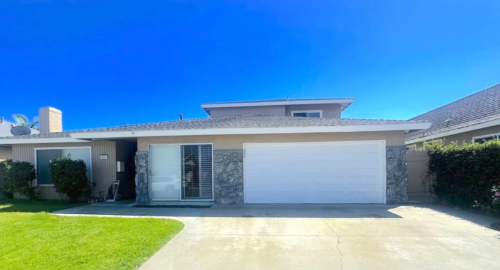


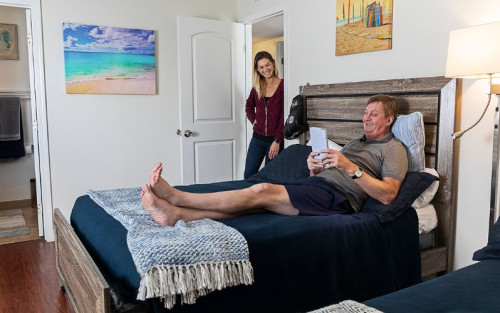
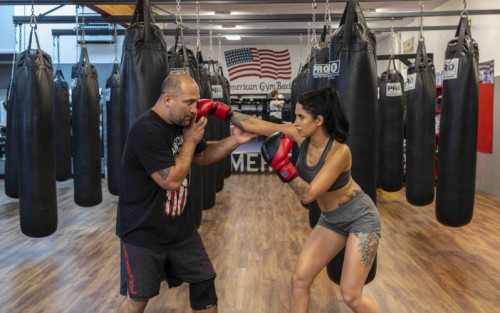




Asana Recovery
Verified Center
This provider's information has been quality-checked by Recovery.com's Research Team for accuracy and completeness, including center verification through appropriate third-party organizations.
Treatment Focus
This center treats substance use disorders and co-occurring mental health conditions. Your treatment plan addresses each condition at once with personalized, compassionate care for comprehensive healing.
Primary Level of Care
Treatment Focus
This center treats substance use disorders and co-occurring mental health conditions. Your treatment plan addresses each condition at once with personalized, compassionate care for comprehensive healing.
Primary Level of Care
Provider's Policy
We remain committed to securing in-network partnerships with more providers, ensuring that individuals seeking substance abuse treatment can access the care they deserve, whether for outpatient programs, intensive outpatient care (IOP), partial hospitalization (PHP), or additional support services like detox when needed.
Asana Recovery
Asana Recovery
About Asana Recovery
Asana Recovery treats addiction and dual diagnoses throughout Orange County. They offer outpatient services including day treatment, intensive outpatient, and general outpatient care. They use a biological, psychological, and social (BPS) approach to recovery and craft a unique treatment plan for each client. Specialized treatment tracks cater to veterans, clients with co-occurring mental health conditions, and couples.
Customized Care Using Evidence-Based and Holistic Approaches
Asana Recovery provides an initial assessment to determine treatment needs. Asana’s staff includes medical doctors, clinical social workers, therapists, counselors, and support staff. All practitioners continuously collaborate to tailor treatment to each client’s progress, needs, and goals. They provide evidence-based therapies like cognitive behavioral therapy (CBT), dialectical behavioral therapy (DBT), eye movement desensitization and reprocessing (EMDR), and medication-assisted treatment if necessary. Clients additionally receive education on addiction and recovery, holistic therapies, family therapy, and recreational outings during treatment.
Get Ongoing Support for Lasting Recovery
Asana Recovery’s outpatient services include day treatment (or partial hospitalization), intensive outpatient, and general outpatient. In day treatment, clients spend 6 hours daily at Asana Recovery, 5-7 days weekly. Clients in this program choose 1 of 3 treatment avenues to focus on: Vocational, Educational, or Employment. In intensive outpatient, clients attend in-person or virtually 3 hours daily, Monday-Friday. Clients come in a few times a week during general outpatient to stay connected to therapy, peer support, and recovery resources. Asana Recovery provides 12-Step and SMART Recovery support groups to enhance their treatment.
Find Focused Treatment for Veterans, Couples, and Dual Diagnoses
Asana Recovery has specialized treatment tracks for veterans, couples, and those with dual diagnoses. Their veterans track groups veterans together and provides trauma-focused therapies, life skills, stress management techniques, and holistic therapies. Their dual diagnosis program addresses co-occurring mental health conditions like depression, anxiety, post-traumatic stress disorder (PTSD), bipolar disorder, and more. Asana Recovery provides addiction treatment for couples who are recovering together with a multidisciplinary team creating customized programs based on the couples’ needs.

Highlights from the Center
Highlights
These highlights are provided by and paid for by the center.
Customized Treatment Plans
Co-Occurring Disorders Treatment
Pet Friendly
Addiction Recovery
Center Overview
Treatment Focus
This center treats substance use disorders and co-occurring mental health conditions. Your treatment plan addresses each condition at once with personalized, compassionate care for comprehensive healing.
Joint Commission Accredited
The Joint Commission accreditation is a voluntary, objective process that evaluates and accredits healthcare organizations (like treatment centers) based on performance standards designed to improve quality and safety for patients. To be accredited means the treatment center has been found to meet the Commission's standards for quality and safety in patient care.

Asana Recovery
Insurance Accepted
Cash Pay Rates
Estimated Cash Pay Rate
Center pricing can vary based on program and length of stay. Contact the center for more information. Recovery.com strives for price transparency so you can make an informed decision.




Recovery.com Verified Listing
Recovery.com verified that the name, location, contact information and license to operate for this treatment provider are valid and up-to-date.

Joint Commission Accredited

Licensed by California DHCS

NAATP Member
Recovery.com is an independent, third-party mental health resource. Verification does not imply endorsement and does not guarantee the quality of treatment services.
Meet Your Care Team

Yesenia Nicols
Vice President

Linda In
Facilities Director

Dr. Chris Small
Medical Director
M.D., Ph.D.
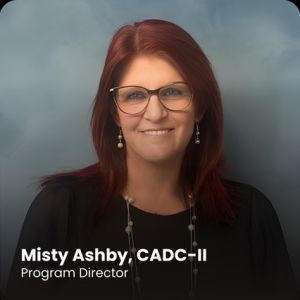
Mitsy Ashby
Program Director
CADC II

Sheida Shavalian
Clinical Director
LMFT

Olive Shandrow
Support Member
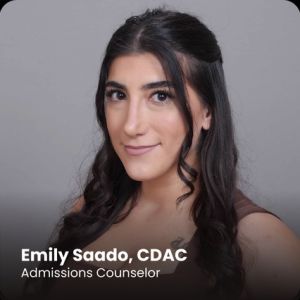
Emily Saado
Admissions
Your Care Options
Specializations
Alcohol
Using alcohol as a coping mechanism, or drinking excessively throughout the week, signals an alcohol use disorder.
Co-Occurring Disorders
A person with multiple mental health diagnoses, such as addiction and depression, has co-occurring disorders also called dual diagnosis.
Pet Friendly
For greater comfort and healing, pet-friendly treatment centers welcome dogs and animal companions to stay with their owners while they attend treatment.
Depression
Symptoms of depression may include fatigue, a sense of numbness, and loss of interest in activities. This condition can range from mild to severe.
Drug Addiction
Drug addiction is the excessive and repetitive use of substances, despite harmful consequences to a person's life, health, and relationships.
Outpatient
During outpatient rehab, patients attend a structured treatment program while continuing to live at home.
Veterans
Patients who completed active military duty receive specialized treatment focused on trauma, grief, loss, and finding a new work-life balance.
Who We Treat
Older Adults
Addiction and mental health treatment caters to adults 55+ and the age-specific challenges that can come with recovery, wellness, and overall happiness.
Co-Occurring Disorders
A person with multiple mental health diagnoses, such as addiction and depression, has co-occurring disorders also called dual diagnosis.
Executives
Executive treatment programs typically directly support the needs of people who manage businesses and may provide flexible schedules and office space to allow work during treatment.
Young Adults
Emerging adults ages 18-25 receive treatment catered to the unique challenges of early adulthood, like college, risky behaviors, and vocational struggles.
LGBTQ+
Addiction and mental illnesses in the LGBTQ+ community must be treated with an affirming, safe, and relevant approach, which many centers provide.
Men and Women
Men and women attend treatment for addiction in a co-ed setting, going to therapy groups together to share experiences, struggles, and successes.
Treatment Services
Day Treatment
In a PHP, patients live at home but follow an intensive schedule of treatment. Most programs require you to be on-site for about 40 hours per week.
Intensive Family Program
Some rehabs offer intensive programs for loved ones. Group and individual therapy sessions help everyone heal, and improve family dynamics.
Intensive Outpatient Program
In an IOP, patients live at home or a sober living, but attend treatment typically 9-15 hours a week. Most programs include talk therapy, support groups, and other methods.
Private Therapy
This is an individual therapy that's often available at private therapy clinics. Clients may be able to choose a therapist who best fits their unique needs.
Outpatient
During outpatient rehab, patients attend a structured treatment program while continuing to live at home.
Recovery School
Recovery high schools provide students overcoming substance use or co-occurring disorders with integrated support services alongside traditional academics.
Approaches
Evidence-Based
A combination of scientifically rooted therapies and treatments make up evidence-based care, defined by their measured and proven results.
Family Involvement
Providers involve family in the treatment of their loved one through family therapy, visits, or both–because addiction is a family disease.
Holistic
A non-medicinal, wellness-focused approach that aims to align the mind, body, and spirit for deep and lasting healing.
Individual Treatment
Individual care meets the needs of each patient, using personalized treatment to provide them the most relevant care and greatest chance of success.
Non 12 Step
Non-12-Step philosophies veer from the spiritual focus of the 12-Steps and instead treat the disease of addiction with holistic or secular modalities.
One-to-One
Patients work with their treatment team members on a 1-on-1 basis, keeping their journey and treatment fully private and personalized.
Personalized Treatment
The specific needs, histories, and conditions of individual patients receive personalized, highly relevant care throughout their recovery journey.
Twelve Step
Incorporating spirituality, community, and responsibility, 12-Step philosophies prioritize the guidance of a Higher Power and a continuation of 12-Step practices.
Therapies
1-on-1 Counseling
Patient and therapist meet 1-on-1 to work through difficult emotions and behavioral challenges in a personal, private setting.
Meditation & Mindfulness
A practiced state of mind that brings patients to the present. It allows them to become fully aware of themselves, their feelings, and the present moment.
Trauma-Specific Therapy
This form of talk therapy addresses any childhood trauma at the root of a patient's current diagnosis.
Online Therapy
Patients can connect with a therapist via videochat, messaging, email, or phone. Remote therapy makes treatment more accessible.
Rational Emotive Behavior Therapy
A type of cognitive therapy that identifies negative self-defeating thoughts and behaviors, rewriting beliefs to be positive, empowering, and present.
Mindfulness Therapy
This ancient practice can be mental, emotional, and even spiritual. In meditation, you focus your attention on the present moment without judgement.
Adventure Therapy
This experiential approach uses the physical and emotional challenges of outdoor activities as tools for personal growth.
Conditions We Treat
Schizophrenia
Schizophrenia is a serious mental health condition that causes hallucinations, delusions, and disordered thinking.
Grief and Loss
Grief is a natural reaction to loss, but severe grief can interfere with your ability to function. You can get treatment for this condition.
Personality Disorders
Personality disorders destabilize the way a person thinks, feels, and behaves. If untreated, they can undermine relationships and lead to severe distress.
ADHD, ADD
ADHD is a common mental health condition caused by dopamine imbalance. Common symptoms include inattention, hyperactivitiy, and impulsivity.
Anger
Although anger itself isn't a disorder, it can get out of hand. If this feeling interferes with your relationships and daily functioning, treatment can help.
Anxiety
Anxiety is a common mental health condition that can include excessive worry, panic attacks, physical tension, and increased blood pressure.
Bipolar
This mental health condition is characterized by extreme mood swings between depression, mania, and remission.
Burnout
Burnout entails mental and physical exhaustion, and leads to a severe lack of fulfillment. This condition is often caused by overwork.
Substances We Treat
Alcohol
Using alcohol as a coping mechanism, or drinking excessively throughout the week, signals an alcohol use disorder.
Benzodiazepines
Benzodiazepines are prescribed to treat anxiety and sleep issues. They are highly habit forming, and their abuse can cause mood changes and poor judgement.
Chronic Relapse
Consistent relapse occurs repeatedly, after partial recovery from addiction. This condition requires long-term treatment.
Co-Occurring Disorders
A person with multiple mental health diagnoses, such as addiction and depression, has co-occurring disorders also called dual diagnosis.
Cocaine
Cocaine is a stimulant with euphoric effects. Agitation, muscle ticks, psychosis, and heart issues are common symptoms of cocaine abuse.
Drug Addiction
Drug addiction is the excessive and repetitive use of substances, despite harmful consequences to a person's life, health, and relationships.
Ecstasy
Ecstasy is a stimulant that causes intense euphoria and heightened awareness. Abuse of this drug can trigger depression, insomnia, and memory problems.
Heroin
Heroin is a highly addictive and illegal opioid. It can cause insomnia, collapsed veins, heart issues, and additional mental health issues.
Psychedelics
Hallucinogenic drugs—like LSD—cause euphoria and increased sensory experiences. When abused, they can lead to depression and psychosis.
Languages
Aftercare
Care Designed for Your Needs
Personal Amenities
Amenities
Special Considerations
Clients can bring their own pet(s)
For greater comfort and healing, pet-friendly treatment centers welcome dogs and animal companions to stay with their owners while they attend treatment.
Couples program
Using gentle clinical care, therapists guide patients and their partner through guided sessions to address issues and work towards lasting solutions.
Executive Program
Addiction and mental health treatment for executives typically involves high discretion, greater technology access, and more private, 1-on-1 care.
Flexible technology policies
Centers with flexible technology policies allow professionals to stay in touch with work and give patients a greater sense of connection and normalcy.
Young Adults Program
Programs for young adults bring teens 18+ together to discuss age-specific challenges, vocational and educational progress, and successes in treatment.
Activities
Yoga
Yoga is both a physical and spiritual practice. It includes a flow of movement, breathing techniques, and meditation.
Off-Site Activities
Off-Site Amenities
Learn More About the Center
Recovery on the Pacific Ocean
Embark on a transformative journey to sobriety at a serene beachfront rehabilitation center, where the healing power of the Pacific Ocean supports your path to lasting recovery.
Couples Treatment: Healing Together on the Journey to Recovery
Asana Recovery offers specialized couples treatment programs designed to address addiction while strengthening relationships, providing a supportive environment for both partners to heal and grow together.
Virtual PHP/IOP Treatment for Lasting Recovery
Achieve lasting recovery with Virtual PHP/IOP treatment, designed to support your healing while allowing you to maintain work and daily responsibilities.
Video Interviews, Discussions, and More
Watch videos from Asana Recovery to learn more about their programs, their staff, and their treatment experience.
What people are saying
Treatment
5.0
Accommodations
5.0
Food & Nutrition
4.9
Value
5.0
Pros
- Treated With Respect (6)
- Beautiful Location (5)
- Trustworthy (5)
- Confidential (5)
Cons
- Hidden Costs (2)
KJ
Treatment in 2023 • (90 days) • Reviewed 08/09/24
Loved One of a Former Client
•Orange County, CA
Emily S
Treatment in 2023 • (60 days) • Reviewed 08/17/24
Former Client
D.C.
Treatment in 2023 • (90 days) • Reviewed 08/05/24
Loved One of a Former Client
Mark S
Treatment in 2017 • (90 days) • Reviewed 08/06/24
Loved One of a Former Client
•Newport Beach, CA
Jane T
Treatment in 2024 • (90 days) • Reviewed 07/06/24
Loved One of a Former Client
•Westminster, CA





